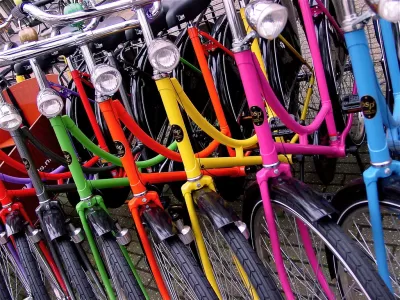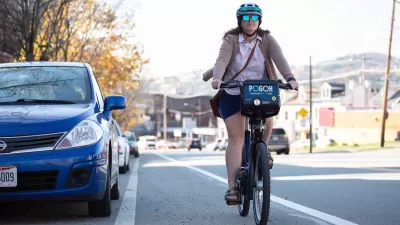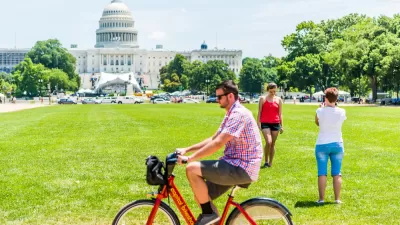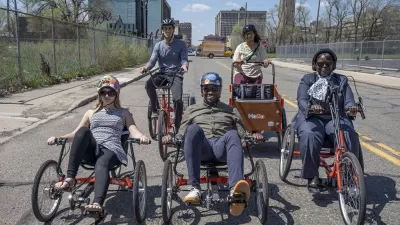Bike sharing and rental systems are becoming more inclusive, considering the needs of those with disabilities and children. And systems are expanding based different uses people have for different types of bicycles.

Bikesharing and bike rental has been popping up all over the United States the past few years, with more and more communities recognizing the benefits of sharing bicycles. Patrick Holland, a Master's in City and Regional Planning student at The Ohio State University, and I have been exploring the different types of bicycles that are being included in bicycle sharing/rental systems, with a particular interest in learning about programs that are making bike sharing more accessible to the physically disabled.

Most bike-sharing/rental systems only offer comfortable commuter-style bicycles, but a handful of systems are experimenting with incorporating bicycles for other use cases and other types of users. Tandem bikes, cargo bikes, handcycles, pedelecs and children’s bicycles are starting to surface in systems to provide community members with bikes that meet their needs.

Fort Collins, Colorado's bike library provides 14 different bicycle options including cruisers, tandems, bike trailers, and children's bicycles. The bikes come in different colors and sizes. The bike library has collaborated with the downtown transit center to create a bike library hub and paved the way to become an extension of public transit. The $10 daily fee is waived if the bike is returned by 1 pm on the same day. The bike library accomplished two goals: to encouraging shorter-term use of bikes for higher turnover and to generating revenue for program enhancements.
Vallocycle, the Montevallo, Alabama bike rental program was the first citywide bike rental program in the state. The system includes different sized bicycles with single and multispeed cruisers, mountain bikes, road cycles, children’s bicycles and two handcycles. Annual membership costs $25 for adults, $10 for children, and includes 7-day bicycle rental and renewals.
In Birmingham, Alabama a bicycle share will feature 100 battery-powered pedal assistance bicycles, known as pedelecs. These types of bikes feature an electric motor that assists the user in pedaling. Using these bicycles while riding up hills will take the same amount of effort as riding on a flat road. Bewegen Technologies, who is providing the technology for Birmingham’s system, claims their bikes can complete a full battery charge in one hour which will have a 24-48 hour battery life depending on usage. A screen on the bike tells the rider if it is not charged enough to be ridden and then a technician is immediately notified. The addition of pedelecs into a bike share fleet diminishes obstacles to access for the elderly, people who are obese or people with other health concerns. Adding pedelecs to a fleet not only provides bikes to a wider population, they also help extend the distance people can cover during a rental period. The Birmingham system is expected to launch this fall. The University of Tennessee at Knoxville pedelec bike share system has been operating for one year as a research experiment to understand how electric assist bikes would be used.
This fall, The Ohio State University launched its bike share system with a focus on accessibility. The system is piloting five different types of bicycles including cruisers, side by side tandems, cargo bikes, recumbent tricycles and heavy duty bicycles. The Ohio State system was designed with a focus on accessibility for a wide array of users, including those with mobility disabilities. For example, the side by side tandem was selected to allow a visually impaired rider to ride with a sight guide. Each rider pedals at their own speed and with three wheels there is no concern about balance. The sight guide is responsible for steering and braking. The handcycle can be used by riders with limited leg mobility, allowing the user to pedal with his or her hands rather than legs. The heavy duty bicycles support riders who weigh up to 550 pounds, providing a safe, comfortable ergonomic riding position. Recumbent tricycles, provide riders with a comfortable seat and laid back position and spreading your body weight over a larger area compared provides added comfort. The relaxed seat position means less back, shoulder and neck pain some people experience while riding traditional bikes. Three-wheeled cargo bicycles were included to help those with balance issues and to make it convenient for all riders to make a trip to the store.
With the introduction of different spokes for different folks into bike sharing/rental systems more people, regardless of ability, will have the opportunity to move freely throughout cities, explore new destinations, and get some exercise while having fun.
Does your community have different spokes included as part of your bike share/rental program? If it does, tell us about it.

Alabama: Trump Terminates Settlements for Black Communities Harmed By Raw Sewage
Trump deemed the landmark civil rights agreement “illegal DEI and environmental justice policy.”

Study: Maui’s Plan to Convert Vacation Rentals to Long-Term Housing Could Cause Nearly $1 Billion Economic Loss
The plan would reduce visitor accommodation by 25% resulting in 1,900 jobs lost.

Why Should We Subsidize Public Transportation?
Many public transit agencies face financial stress due to rising costs, declining fare revenue, and declining subsidies. Transit advocates must provide a strong business case for increasing public transit funding.

Paris Bike Boom Leads to Steep Drop in Air Pollution
The French city’s air quality has improved dramatically in the past 20 years, coinciding with a growth in cycling.

Why Housing Costs More to Build in California Than in Texas
Hard costs like labor and materials combined with ‘soft’ costs such as permitting make building in the San Francisco Bay Area almost three times as costly as in Texas cities.

San Diego County Sees a Rise in Urban Coyotes
San Diego County experiences a rise in urban coyotes, as sightings become prevalent throughout its urban neighbourhoods and surrounding areas.
Urban Design for Planners 1: Software Tools
This six-course series explores essential urban design concepts using open source software and equips planners with the tools they need to participate fully in the urban design process.
Planning for Universal Design
Learn the tools for implementing Universal Design in planning regulations.
Smith Gee Studio
Alamo Area Metropolitan Planning Organization
City of Santa Clarita
Institute for Housing and Urban Development Studies (IHS)
City of Grandview
Harvard GSD Executive Education
Toledo-Lucas County Plan Commissions
Salt Lake City
NYU Wagner Graduate School of Public Service






























